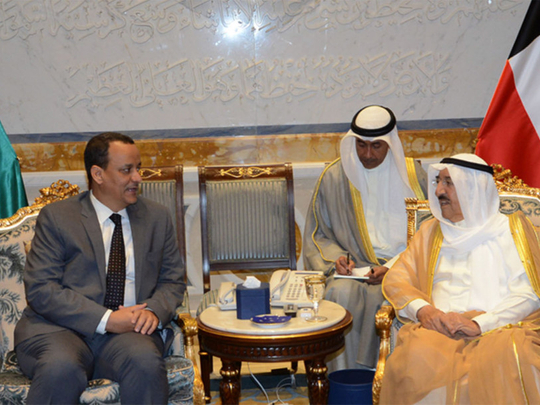
Kuwait: Yemen’s warring parties are sending conciliatory signals ahead of UN-backed talks starting on Monday, in a rare sign of mutual willingness to end a year-old conflict that has caused one of the world’s worst humanitarian crises.
A deal may help defuse tensions between Iran and Saudi Arabia, who are allied to opposing sides in Yemen.
“We are ready for a political transition which excludes no one ... The world now looks to the Kuwait consultations as a landmark of peace for Yemenis, and we will give everything we can to alleviate the suffering of the people,” Foreign Minister Abdul Malek Al Mekhlafi, from the Yemeni government now based in Aden, told state news agency Saba.
Mohammad Abdul Salam, spokesman for the Al Houthi militia, which controls Sana’a, appeared conciliatory in an interview with Kuwaiti newspaper Al-Rai on Saturday.
“There should be a consensus authority during a definite transitional phase to decide every political dispute,” he was quoted as saying. “Iran does not have any role in our sovereign decisions and we are not tools in anyone’s hands.”
Saudi Arabia and its Gulf Arab allies joined the war on March 26 of last year to back Yemen’s government after it was pushed into exile by Al Houthis.
UN talks in June and December failed to end the war that has killed about 6,200 people, about half of them civilians. The war has allowed Al Qaida fighters to seize territory and opened a path for Daesh militants to gain a foothold in the country.
An unprecedented calm achieved between the two main antagonists beginning in March suggests that exhaustion over costs and casualties may be mounting. Al Houthis agreed with Saudi Arabia to reduce attacks on the kingdom in exchange for a halt to Saudi-led air strikes on Sana’a, and the two sides carried out a prisoner exchange.
“This represents the best opportunity to end the war since it started – real progress has been made,” said Adam Baron, a visiting fellow at the European Council on Foreign Relations.
The fate of Ali Abdullah Saleh, Yemen’s president of 33 years who was ousted by ‘Arab Spring’ protests in 2012 and who has since formed an alliance with the Al Houthis, remains unclear and could complicate transition plans.
While Saleh’s party will take part in the talks, the former leader has refused to depart Yemen’s political scene. The spread of Al Qaida and Daesh in the south also makes it more difficult to resolve the conflict.
“There are a slew of potential spoilers. The past year has seen a proliferation of warlords whose power is tied to the conflict continuing,” added Baron.
Al Houthis said pushed President Abd Rabbo Mansour Hadi from power in September 2014 and formed an alliance with his predecessor Saleh.
Arab nations accuse the group of a power-grab which would benefit their archrival Iran, and have fought to restore Hadi’s government.












